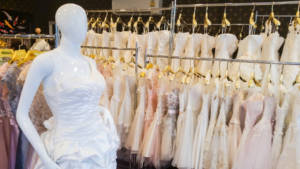
With shifts in wedding trends and customers seeking new options, many ask if big-box bridal stores will be able to stand these and future challenges.
In November 2018, CNN reported that David’s Bridal filed for Chapter 11 bankruptcy protection. Documents filed in a U.S. bankruptcy court show that the corporation owes between $500 million and $1 billion to creditors. Some possible factors leading to the American company’s troubles include a decline in marriages, more casual weddings, and strong competition from online and brick-and-mortar retailers. With the same developments occurring in Canada, it’s worth an examination of how they have impacted big-box bridal stores.
Marriage Rates Are Declining
The Canadian Encyclopedia mentions that the marriage rate in Canada is dropping. Statistics Canada recently revealed that married couples head around 65 percent of households. That’s a slight decline from 2001’s findings, which indicated that married pairs headed 70 percent of households. Changing attitudes about marriage and financial worries may have caused this decline.
More Couples Choose Casual Weddings
Nearly every wedding magazine or website offers suggestions for hosting casual affairs. Wedding Wire’s trends report from 2018 mentions some recent notable trends:
- Grooms are selecting more laidback attire.
- More couples write their own vows.
- Wedding parties are walking down the aisle to non-classical music.
A March 2018 piece in Canadian Living supports these observations. Writer Jessica Alcock comments that modern bridal fashions tend to be simple and elegant. Another key trend focuses on gowns designed with runway-inspired details.
Competition From Brick-and-Mortar Retailers
Discount outlets and department stores have made inroads in the industry. As a result, their competition presents challenges for big-box bridal stores. A July 2018 Glamour article showed several gorgeous and inexpensive department-store gowns. Some of these businesses, such as Nordstrom and Saks Fifth Avenue, have store locations in Canada. Hudson’s Bay also partnered with New York City bridal boutique Kleinfeld, offering a wide range of gowns at its Toronto Queen Street location.
Local independent bridal shops provide personalized service and unique formalwear options. Wedding Wire Canada maintains a directory of Canadian boutiques. Several of these stock vintage, consignment, and pre-owned gowns. Brides who want a vintage look or who wish to save some cash can discover fabulous finds at these and other locally owned stores.
Better Deals and More Options Online
Online shops also offer a huge range of options. Many American premier boutiques, some major department stores, and specialty shops ship to Canada. A few examples include Macy’s, Bergdorf Goodman, Revolve, and Forward by Elyse Walker. Anomalie, an online bridal-wear startup, produces custom gowns crafted to meet each bride’s specifications. Their creation occurs during a collaborative process between the bride and a company stylist. The result is a made-to-measure dress that’s shipped directly to the bride. Often, these distinctive gowns cost much less than a comparative dress found in a big-box bridal store.
Can Big-Box Bridal Stores Change With the Times?
All these developments have affected the bottom lines of large retailers like David’s Bridal and Alfred Angelo. David’s Bridal currently has 12 locations throughout Canada. As for Alfred Angelo, the corporation had filed for Chapter 7 bankruptcy protection in United States federal court in July 2017. The South Florida Sun Sentinel reported in July 2018 that all its retail stores have permanently closed. Moreover, the company still owed brides more than $20 million in claims for gowns that were never delivered.
David’s Bridal and Alfred Angelo relied on classic industry business models. With shifts in wedding trends and customers seeking new options, both companies saw their profits plummet. Will big-box bridal stores like them be able to weather these and other future challenges? That remains to be seen, but the bottom line is that couples will turn to vendors who can provide the products, prices, and services they need.


